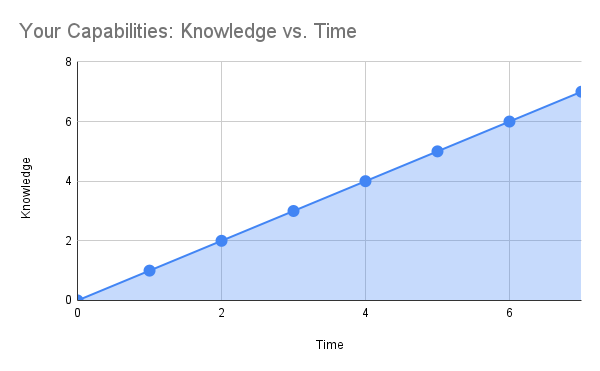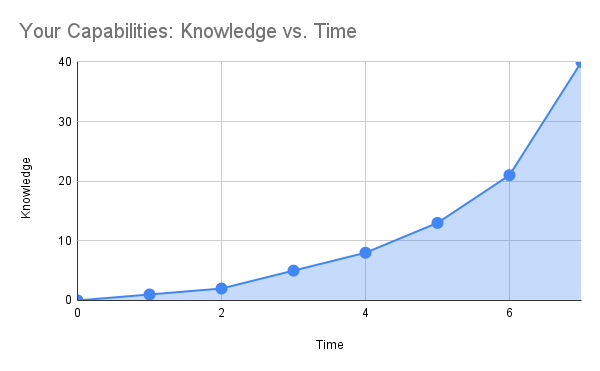Compound your Capabilities and Knowledge with Intentionality
I once had a manager who asked me the following question:
"Do you want to look back in five years and see five of the same experiences? Or, do you want to see five unique experiences, one each year?"
It was a great question. I had never thought like that before.
When I was asked that question, I had just obtained my first senior job title in my career. I was very excited to be working where I was at and to have earned that title. I was working with cool, new technology on a cool, new project. However, now that I had obtained the title I was looking for, I wasn't sure what would set me apart going forward.
Many of the developers around me, senior title or not, could deliver as well as I could. Some of them understood the technologies we were using better than I did.
During my time in that role, I discovered that there would always be new technologies to learn, new business problems to solve, and new teams to work alongside. I also learned a critical lesson that has stuck with me today: Make frequent deposits into my knowledge account.
Before this point in my career, the thoughts of individuals outside of my company were foreign to me. I had seen posts here and there on Hacker News and Reddit about software development, but I did not know how they applied to my day-to-day. I didn't seek this kind of content out frequently. Because of this, the broader trends and ideas in the content never seemed to "click" with me.
Shortly after I was asked that question, I started doing the following:
- Reading books about software development
- Going to conferences
- Going to Meetups about tech in my city
- Talking to others about their thoughts are of various industry-related topics
After doing these things for a year or so, I started to notice that I understood more. Work was no longer a set of somebody else's tasks that I needed to get done. I started to understand why we were tackling specific problems and taking certain approaches.
I imagine you might be thinking: "OK, great. You learned something. Why should I do all of this? I don't get paid to do all of this extra work!" Hear me out. Gaining knowledge can open exciting doors in your career. You want to optimize for having as much of it as possible as soon as possible. The more knowledge you can have soon, the sooner you can get to the exciting work.
To illustrate the point, I want to use two graphs. Both of these show your knowledge at a particular point in time. The units of time and knowledge are arbitrary but are consistent between the two graphs.
The 9 to 5: Linear Growth of Knowledge

A Little Extra: Exponential Growth of Knowledge

The first graph is what it could look like if you only gain knowledge in your 9 to 5 job. You'll get better at a consistent linear rate. The second graph is what your knowledge acquisition could look like if you are intentional about looking around outside of your day job. Over the same amount of time, you could have a lot more knowledge.
Your capabilities are measured by the amount of knowledge you have at this moment in time. A little bit of extra work today works just like an investment would: the value compounds over time. Some intentionality every month can yield new capabilities in your skill-set a year from today.
With a little extra intentionality for a couple of years, you can be way ahead of where you would otherwise be learning only in your 9 to 5. This is how you get to be an organization changer, a start-up builder, or a chief architect. The ROI on this learning for your career growth can be enormous.
You've made the first step by getting to the end of this article. What will be your next step?